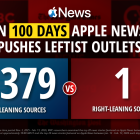One man’s potential nomination to the Federal Communications Commission (FCC) may change the future of the internet.
President Donald Trump’s impact on the fight for free speech may be decided soon, as a Wednesday vote approaches on whether National Telecommunications and Information Administration (NTIA) senior adviser Nathan Simington will be appointed to the FCC. If named FCC Commissioner, he could finally give American representatives the power to regulate Big Tech in favor of free speech. The Wall Street Journal Editorial Board endorsed him and warned on Nov.17: “Republicans shouldn’t dither on confirming Nathan Simington to the Federal Communications Commission,” explaining Simington “will be needed to oppose internet regulation early in a Biden Presidency.”

The Journal’s Editorial Board scorched self-sabotaging Republicans for “Confirmation Mischief” and illustrated:
“A source says some GOP Senate staff are stalling Mr. Simington’s confirmation because they’re angling for the seat in a Biden Presidency. That’s self-serving and short-sighted. Mr. Simington deserves to be confirmed in the lame duck.”
Founder and President of the Media Research Center L. Brent Bozell III declared his support for Simington’s nomination:
“There's a critical vote in the Senate Commerce Committee this week. I encourage Senators who value free speech to vote in support of Nathan Simington's nomination to the FCC. Don't let censorship win!”
Trump similarly urged his allies to support Simington on Nov. 10 as senators battled over Simington’s potential nomination that same day:
“Nate Simington, a very smart and qualified individual, is having his Senate hearing today. Republicans will hopefully confirm him to the FCC ASAP! We need action NOW on this very important nomination!! @SenatorWicker @MarshaBlackburn @senatemajldr.”
Like Trump himself, Simington has terrified both the far left that dominates Big Tech and the left-enabling establishment right who oppose government involvement in regulating social media companies.
Simington “played a significant role in the agency’s social media regulation agenda,” Benton Institute for Broadband & Society reported. The Institute suggested that, if confirmed, “the nomination would represent a significant blow to Republicans who favor a light-touch approach to telecom policy.”
The Institute added that “his nomination would be a victory for Republicans who want to see the FCC take a larger role in regulating social networks.” It also noted that “In Aug, President Donald Trump abruptly withdrew Commissioner O’Rielly’s nomination after O'Rielly gave a speech opposing making changes to Section 230.”
This would not be the only major shake-up at the FCC.
This very week, FCC Chairman Ajit Pai announced his plans to leave on January 20. Among other accomplishments, he recounted that he was proud of “reforms we have instituted to make the agency more accountable to the American people. In particular, for the first time ever, we’ve made public drafts of the proposals and orders slated for a vote three weeks before the agency’s monthly meetings, making this the most transparent FCC in history.”
Conservatives are under attack. Contact your local representative and demand that Big Tech be held to account to mirror the First Amendment while providing transparency, clarity on “hate speech” and equal footing for conservatives. If you have been censored, contact us at the Media Research Center contact form and help us hold Big Tech accountable.









